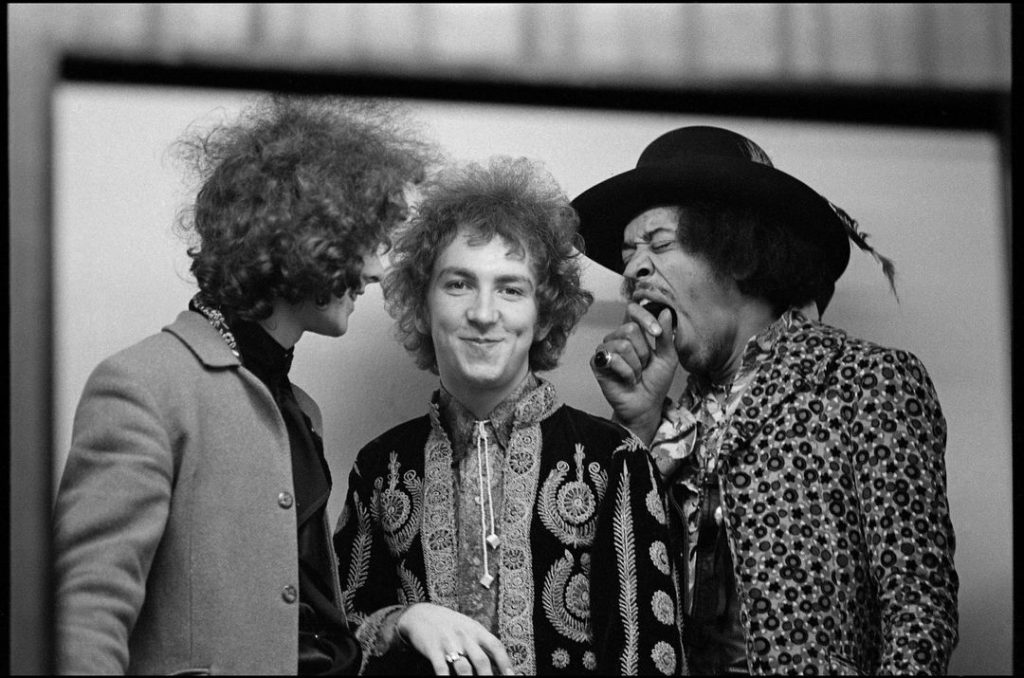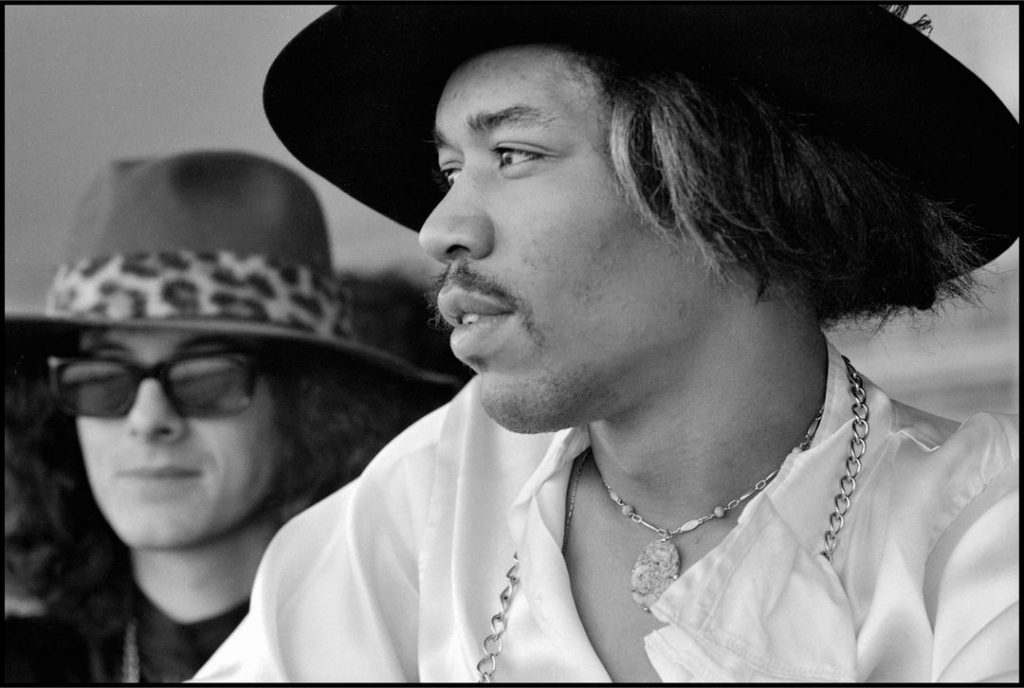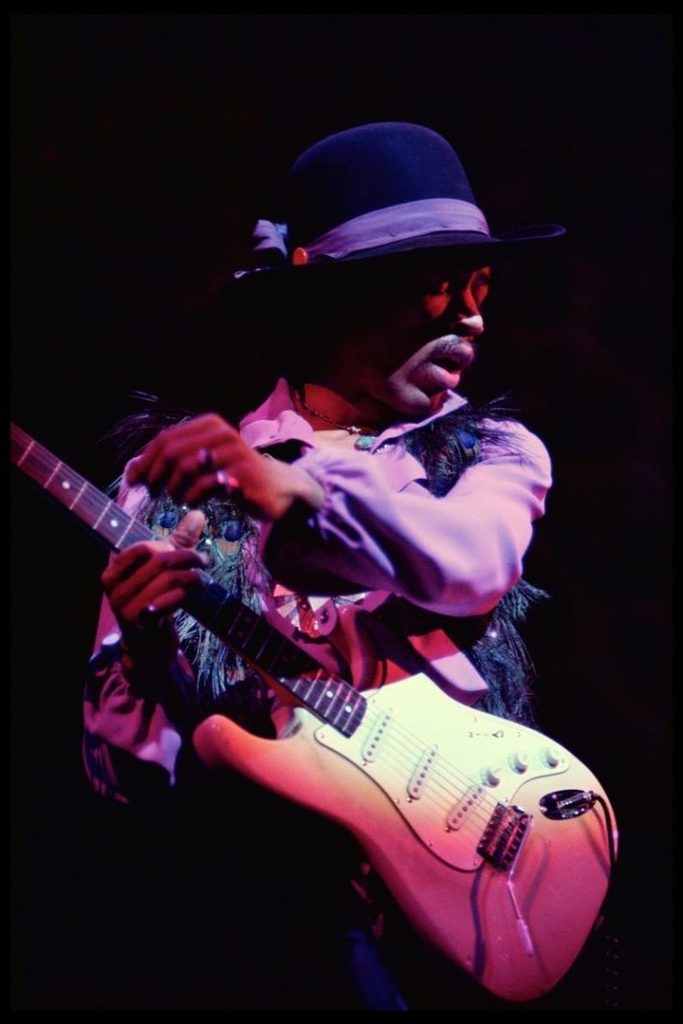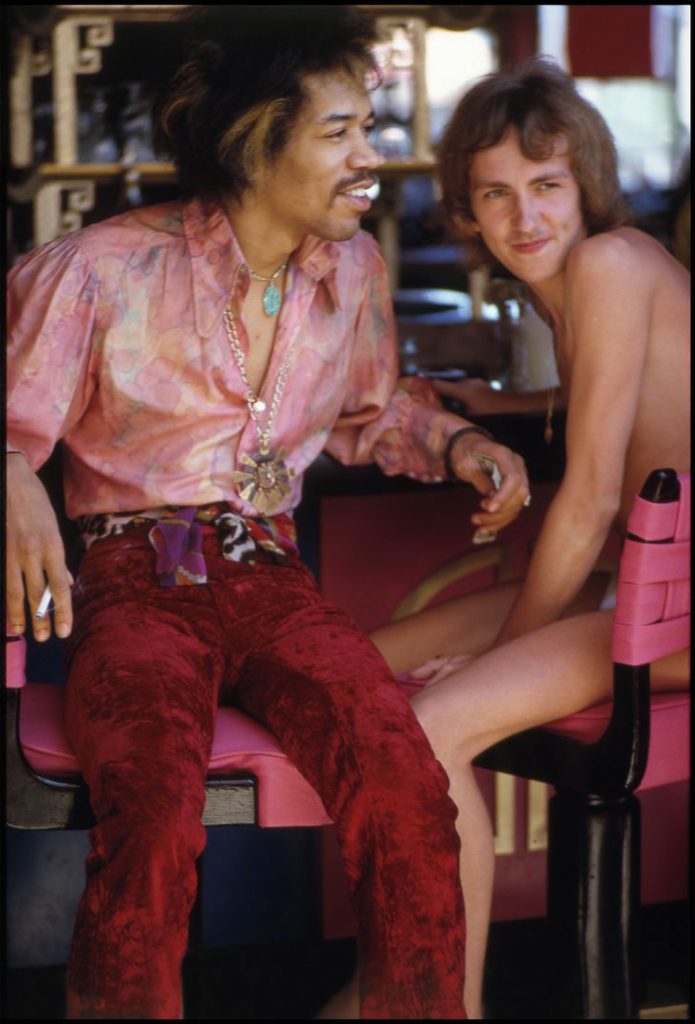From Wikipedia:
James Marshall “Jimi” Hendrix (born Johnny Allen Hendrix; November 27, 1942 – September 18, 1970) was an American musician, singer, and songwriter. Although his mainstream career spanned only four years, he is widely regarded as one of the most influential electric guitarists in the history of popular music, and one of the most celebrated musicians of the 20th century. The Rock and Roll Hall of Fame describes him as “arguably the greatest instrumentalist in the history of rock music”.
Born in Seattle, Washington, Hendrix began playing guitar at the age of 15. In 1961, he enlisted in the US Army, but was discharged the following year. Soon afterward, he moved to Clarksville then Nashville, Tennessee, and began playing gigs on the chitlin’ circuit, earning a place in the Isley Brothers’ backing band and later with Little Richard, with whom he continued to work through mid-1965. He then played with Curtis Knight and the Squires before moving to England in late 1966 after bassist Chas Chandler of the Animals became his manager. Within months, Hendrix had earned three UK top ten hits with the Jimi Hendrix Experience: “Hey Joe“, “Purple Haze“, and “The Wind Cries Mary”. He achieved fame in the US after his performance at the Monterey Pop Festival in 1967, and in 1968 his third and final studio album, Electric Ladyland, reached number one in the US. The double LP was Hendrix’s most commercially successful release and his first and only number one album. The world’s highest-paid performer, he headlined the Woodstock Festival in 1969 and the Isle of Wight Festival in 1970 before his accidental death in London from barbiturate-related asphyxia on September 18, 1970, at the age of 27.
Hendrix was inspired by American rock and roll and electric blues. He favored overdriven amplifiers with high volume and gain, and was instrumental in popularizing the previously undesirable sounds caused by guitar amplifier feedback. He was also one of the first guitarists to make extensive use of tone-altering effects units in mainstream rock, such as fuzz distortion, Octavia, wah-wah, and Uni-Vibe. He was the first musician to use stereophonic phasing effects in recordings. Holly George-Warren of Rolling Stone commented: “Hendrix pioneered the use of the instrument as an electronic sound source. Players before him had experimented with feedback and distortion, but Hendrix turned those effects and others into a controlled, fluid vocabulary every bit as personal as the blues with which he began.”
Hendrix was the recipient of several music awards during his lifetime and posthumously. In 1967, readers of Melody Maker voted him the Pop Musician of the Year and in 1968, Billboard named him the Artist of the Year and Rolling Stone declared him the Performer of the Year. Disc and Music Echo honored him with the World Top Musician of 1969 and in 1970, Guitar Player named him the Rock Guitarist of the Year. The Jimi Hendrix Experience was inducted into the Rock and Roll Hall of Fame in 1992 and the UK Music Hall of Fame in 2005. Rolling Stone ranked the band’s three studio albums, Are You Experienced, Axis: Bold as Love, and Electric Ladyland, among the 100 greatest albums of all time, and they ranked Hendrix as the greatest guitarist and the sixth greatest artist of all time. […]
The Jimi Hendrix Experience was formed in September 1966, with Jimi Hendrix, Noel Redding and Mitch Mitchell. Paul McCartney saw them on various occasions – on October 25, November 25, 1966, January 11, and January 29, 1967.
On April 4, 1967, Paul watched The Jimi Hendrix Experience headline a bill at the Saville Theatre. Jimi opened his set with a version of The Beatles’ “Sgt Pepper’s Lonely Hearts Club Band“, which had been released on the eponym album just three days before.
The biggest single tribute for me was that Sgt. Pepper was released on the Thursday and, on the Sunday, we went to the Savile Theatre and Jimi Hendrix opened up with ‘Sgt Pepper’ and he’d only had since Thursday to learn it.
Paul McCartney – From “Eyewitness: Jimi Hendrix” by Johnny Black, 2004
It would be one of his first gigs in London. Jimi was a sweetie, a very nice guy. I remember him opening at the Saville on a Sunday night, 4 June 1967. Brian Epstein used to rent it when it was usually dark on the Sunday. Jimi opened, the curtains flew back and he came walking forward, playing ‘Sgt. Pepper’, and it had only been released on the Thursday so that was like the ultimate compliment. It’s still obviously a shining memory for me, because I admired him so much anyway, he was so accomplished. To think that that album had meant so much to him as to actually do it by the Sunday night, three days after the release. He must have been so into it, because normally it might take a day for rehearsal and then you might wonder whether you’d put it in, but he just opened with it. It’s a pretty major compliment in anyone’s book. I put that down as one of the great honours of my career. I mean, I’m sure he wouldn’t have thought of it as an honour, I’m sure he thought it was the other way round, but to me that was like a great boost.
Paul McCartney – From “Paul McCartney: Many Years from Now” by Barry Miles, 1997
A few days later, Paul McCartney was in Los Angeles and met John Phillips and Lou Adler, the organizers of the Monterey International Pop Festival. He insisted that the event would be incomplete without Hendrix, whom he called “an absolute ace on the guitar“. Paul agreed to join the board of organizers on the condition that the Jimi Hendrix Experience performs at the festival in mid-June. Jimi’s performance at Monterey in June 1967 launched his US career.
Paul McCartney was the big bad Beatle, the beautiful cat who got us the gig at the Monterey Pop Festival. That was our start in America.
Jimi Hendrix – From “Starting At Zero : His Own Story“, 2013
The first big break we got in the States came courtesy of Paul McCartney who they were trying to involve in the Monterey Pop Festival. He told them it wouldn’t be any kind of music festival without Hendrix. From there, it just burst wide open.
Chas Chandler – Manager of Jimi Hendrix – From “Eyewitness: Jimi Hendrix” by Johnny Black, 2004
No one in the States knew who he was yet. He was playing as Jimmy James & The Blue Flames at The Café Wha? the first time I saw him, and then I’d seen him in London in November as The Jimi Hendrix Experience. When I talked with Brian Jones before Monterey, he told us the same thing Paul McCartney and Andrew Oldham had said: ‘You’ve got to have this guy—he’s tearing Europe to pieces.’
John Phillips – From The Mamas and Papas – Organizer of the Monterey Festival – From “Eyewitness: Jimi Hendrix” by Johnny Black, 2004
After Monterey, Paul McCartney asked Jimi Hendrix if he wanted to be part of the “Magical Mystery Tour” TV special, but this collaboration didn’t happen.
We were supposed to be on The Magical Mystery Tour. The Beatles used to come and see us sometimes, like at certain concerts like the Saville Theater, and Paul told me about this little scene he had. They were planning to do a film and he wanted us to be in this film. We weren’t known then when asked us. He was trying to help us, but we got a nice break before they got the movie together.
Jimi Hendrix – From “Eyewitness: Jimi Hendrix” by Johnny Black, 2004
I’d seen Jimi play so often, that I could tell that his performances were already starting to get a bit out of control by this time. He’d go off into long, jazzy improvisations that made the set difficult to follow. I also knew that part of the problem was that he was mixing a lot (John Lennon and Paul McCartney.] and doing a lot of LSD.
Tony Bramwell – From “Eyewitness: Jimi Hendrix” by Johnny Black, 2004
I didn’t even know they were on acid. It was Tony Bramwell who told me —he was from Liverpool and was the youngest member of the Beatles’ entourage, helping Brian Epstein to run the Saville. He was giving me hell in The Speakeasy for letting them do so much LSD. ‘Don’t you know how much acid they’re doing?’ I said, ‘What the hell are you talking about?’ ‘Hendrix is with Lennon and McCartney and they’re all pouring acid down their throats!’ I said, ‘What?’ I was living in the same flat as Jimi, and I had no idea.
Chas Chandler – Manager of Jimi Hendrix – From “Eyewitness: Jimi Hendrix” by Johnny Black, 2004
Linda put you at your ease. Some photographers, you’re very aware that you’re having a picture taken. But she had such a relaxed attitude that she’d get a picture of Jimi Hendrix, but he’d be yawning in it. He felt comfortable enough to yawn, she felt confident enough to take a picture of him yawning, knowing he wouldn’t mind.
Paul McCartney – From Linda McCartney on Instagram




Unreleased song
Unreleased song

Notice any inaccuracies on this page? Have additional insights or ideas for new content? Or just want to share your thoughts? We value your feedback! Please use the form below to get in touch with us.